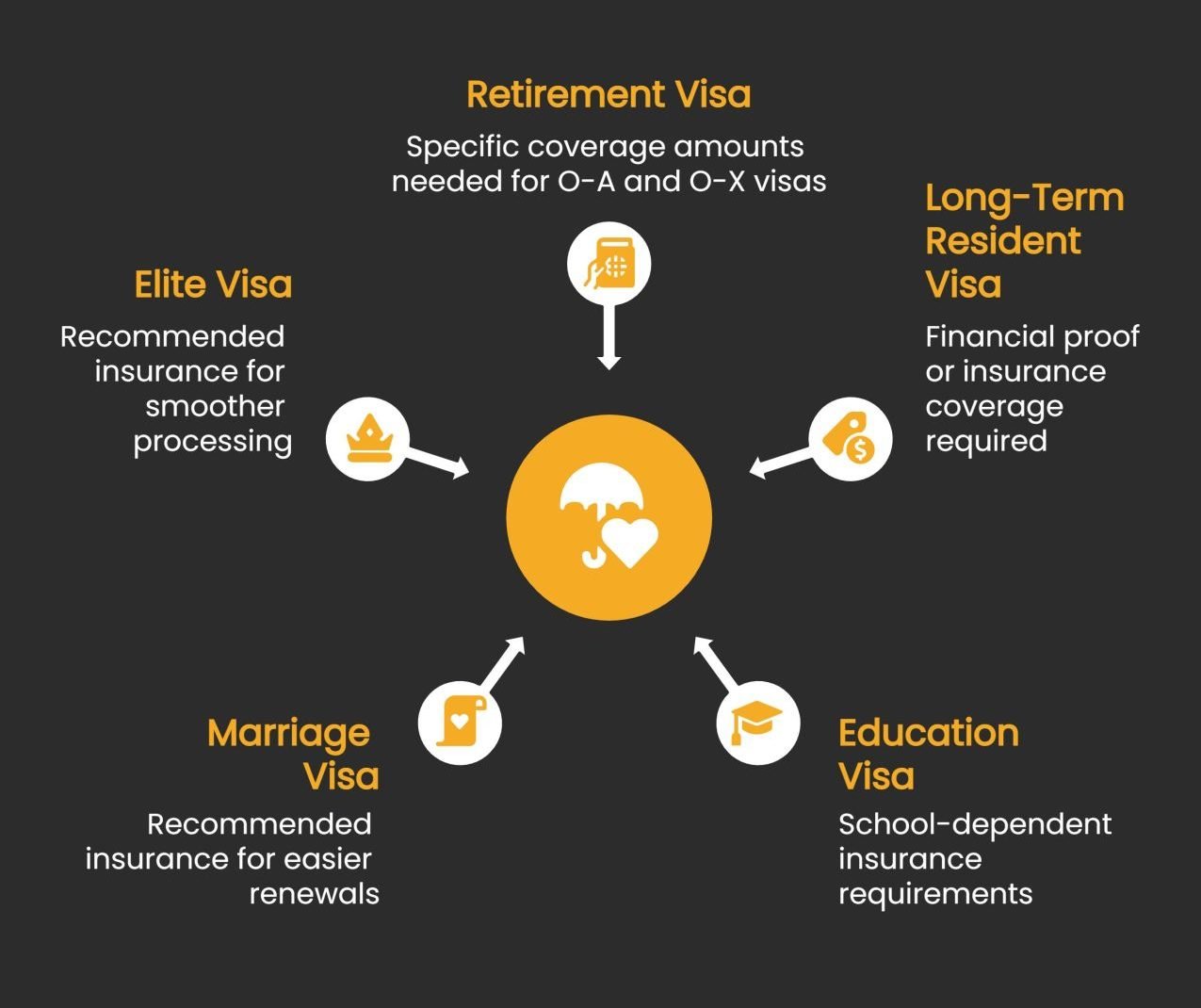Planning to extend your Thai visa? Why health insurance is more important than ever
It can apply to many types but these plans will make the process easier and give you peace of mind for your retirement or long-term stay

If you plan to stay longer in Thailand, having health insurance is now more important than ever. Thai immigration often asks for proof of medical coverage when you apply to extend your visa. This applies to many types of visas, like retirement or long-term stay. Choosing a plan from a trusted company like Cigna can make the process easier and give you peace of mind, knowing you’ll have access to good healthcare during your time in Thailand.
On this page
| Click to jump to Section | summary |
|---|---|
| Thai visa extension types that require health insurance | Many long-term visas, including O-A, O-X, LTR, and some education or dependent visas, now require or strongly recommend health insurance to ensure proper medical coverage during your stay. |
| Why health insurance matters for visa approval in Thailand | Insurance is essential for certain visas, as it proves financial readiness, responsibility, and compliance with Thai immigration rules, which can help smooth the approval and renewal process. |
| The financial risks of being uninsured in Thailand | Without insurance, medical care at private hospitals can be very expensive, emergencies may cause delays or high costs, and visa extensions can be affected, risking serious financial strain. |
| What to look for in a good expat health insurance plan | A good plan should cover hospital and clinic visits, emergencies, chronic conditions, meet visa rules, give access to quality hospitals, and provide fast, easy claims support for peace of mind. |
| How to show proof of insurance during your Thai visa extension | Provide a certificate in English or Thai that clearly shows your name, policy dates, coverage amounts, and any additional letters requested by immigration to confirm valid health insurance. |
Thai visa extension types that require health insurance

Many Thai visa types now require or strongly recommend health insurance to make sure foreigners can get proper medical care while staying in the country. Here’s a simple breakdown of the main visa types where health insurance matters:
Retirement Visa (O-A and O-X)
If you’re 50 or older and applying for a retirement visa, health insurance is required.
- O-A visa: You need at least 400,000 baht coverage for hospital stays and 40,000 baht for outpatient care.
- O-X visa: This 10-year visa needs around 3 million baht in coverage, including for Covid-19.
You can use a Thai or approved international insurer, but you must show proof at immigration.
Long-Term Resident (LTR) Visa
This 10-year visa is for wealthy individuals, retirees, remote workers, and experts.
- You must have at least US$50,000 in health insurance or show other financial proof, like US$100,000 in a Thai bank.
- Dependants need US$25,000 coverage each.
This insurance must stay active for the full visa period.
Education Visa
Health insurance is not always required by immigration, but many schools now ask for it.
This helps protect students during their time in Thailand. Requirements depend on the school.
Marriage or Dependent Visa (Non-Immigrant O)
Insurance is not always a rule, but it’s a smart idea.
Having a policy can make visa renewals easier and help cover any medical costs while staying with your Thai spouse or family.
Thailand Privilege Card (Elite Visa)
This visa gives a long-term stay and special perks.
Health insurance is not required, but it’s recommended.
Having at least US$10,000 in coverage helps if you need private care and may make visa processing smoother.

Health insurance is now a key part of staying in Thailand long-term. If you hold a retirement or long-stay visa, it’s especially important to meet the rules. Choosing a trusted provider like Cigna can help you stay covered and follow Thai immigration requirements with less stress.
Why health insurance matters for visa approval in Thailand

Health insurance plays an important role when applying for or renewing a visa in Thailand. It’s not just a formality; it shows that you’re ready to take care of your health and follow the rules.
1. It’s required by law for some visas
If you’re applying for a Retirement Visa (O-A or O-X) or a Long-Term Resident (LTR) Visa, you must show proof of health insurance.
- Retirement visas usually need coverage of at least 400,000 baht for hospital stays and 40,000 baht for outpatient care.
- LTR visas require at least US$50,000 in coverage, including Covid treatment.
These are official rules set by Thai immigration to make sure long-term visitors are prepared.
2. It shows you’re financially ready
Healthcare in Thailand, especially at private hospitals, can be expensive. Insurance proves that you can pay for medical treatment without needing help from others. It helps avoid big hospital bills that could cause problems for you or your family.
3. It protects Thailand’s healthcare system
Some foreigners in the past left hospitals with unpaid bills, which hurt public hospitals. Requiring insurance helps stop this from happening again. It makes sure the healthcare system stays strong for everyone—locals and foreigners alike.
4. It shows you’re a responsible resident
Having health insurance with a Thai visa shows that you respect the country’s rules and are ready to take care of yourself. Immigration sees this as a good sign, and it can help make visa approvals and renewals go more smoothly.
Health insurance helps you meet visa rules, cover medical costs, and support the local healthcare system. It also shows you’re serious about living in Thailand responsibly. Choosing a trusted provider like Cigna makes it easier to meet these requirements and stay protected while enjoying life in Thailand.
The financial risks of being uninsured in Thailand

Living in Thailand without health insurance can lead to serious money problems, especially if you get sick or injured.
1. Medical care at private hospitals is expensive
If you don’t have insurance, you’ll need to pay for everything yourself.
- A regular doctor visit can cost 1,000 to 2,500 baht.
- A visit to a specialist can cost 1,500 to 4,000 baht or more.
- If you need emergency care, private hospitals may ask for a deposit of 50,000 to 200,000 baht before treating you.
- Surgery or long hospital stays can cost much more, and these bills must be paid out of your own pocket.
2. No insurance can affect your visa
Some visas in Thailand, like retirement or LTR visas, require you to show proof of health insurance.
If you don’t have it, your visa extension might be delayed or even rejected. This could affect your plans and cause extra stress.
3. Emergencies can turn into big problems
In an emergency, being uninsured can delay your treatment.
Public hospitals may give priority to Thai citizens and people with insurance. If you can’t show that you can pay, you might have to wait or be sent somewhere else. This is risky if you’re seriously ill or injured.
4. Large bills can ruin your financial plans
One unexpected medical event can cost a lot. Without insurance, you may need to spend money you saved for living or travelling.
This can make it hard to stay in Thailand long-term, especially if you’re retired or on a fixed income.
What to look for in a good expat health insurance plan

If you’re living in Thailand and plan to extend your Thai visa, choosing the right health insurance is important. A good plan protects your health, supports your visa needs, and gives peace of mind. Here’s a simple checklist to help you find the right one:
1. Covers both inpatient and outpatient care
Make sure the plan pays for hospital stays, surgery, and treatment at the clinic. For retirement visas, you usually need at least 400,000 baht for inpatient care and 40,000 baht for outpatient care.
2. Includes emergency treatment and evacuation
Your plan should cover emergency room visits and, if needed, medical evacuation or return to your home country. This is important if you face a serious accident or illness.
3. Meets Thai visa requirements
Choose a plan that fits the visa rules, like for the O-A, O-X, or LTR visas. It should come with official paperwork that Thai immigration accepts.
4. Access to good hospitals in Thailand and abroad
Look for a plan that gives you access to top hospitals like Bangkok Hospital or Bumrungrad. It’s also helpful if your plan includes care overseas, in case of travel or second opinions.
5. Covers chronic and pre-existing conditions
If you have an ongoing health issue, make sure the plan includes it. Cigna offers flexible options that may cover pre-existing conditions after review, which is a big help for many expats.
6. Fast and easy claims process
A good plan should offer direct billing, so you don’t need to pay first and claim later. Online claims and telemedicine services also make things easier when you need help quickly.
7. Flexible and made for expats
Choose a plan that can grow with you. Look for renewal options even at older ages and extras like family coverage, dental, maternity, or mental health support, if needed.
8. Good value for the price
You want a plan that gives solid coverage at a fair price. Whether you’re a digital nomad or a retiree, plans like those from Cigna balance cost with quality, helping you stay protected without overpaying.
A strong health insurance plan should cover your medical needs, meet visa rules, and offer flexibility and support. Cigna is a trusted choice for expats in Thailand because it ticks all these boxes—making it easier for you to stay healthy and meet visa requirements without stress.
How to show proof of insurance during your Thai visa extension

When you extend your Thai visa, you need to show clear proof that you have valid health insurance. Here’s a simple guide to what you need:
1. Insurance certificate in English or Thai
Your insurance certificate must be written in English or Thai. Immigration officers need to read and check the details easily, so no translation is needed.
2. Show the start and end dates and coverage limits
The certificate must clearly show:
- The start and end dates of your policy
- The coverage amounts
For retirement visas (O-A), you need at least 400,000 baht for hospital stays and 40,000 baht for outpatient care.
For the LTR visa, you need at least US$50,000 in medical coverage, including Covid.
3. Your name must match your passport
Make sure the name on the insurance matches your passport exactly. This proves the policy is yours. If the names don’t match, your visa extension could be delayed or rejected.
4. Get a letter from your insurer if needed
Sometimes, immigration might ask for an extra letter from your insurance company to confirm your coverage details. It’s a good idea to ask your provider for this in advance—especially if you’re using an international insurer.
5. Bring original or certified copies
Always bring the original documents or certified copies when you apply for or renew your visa. Immigration needs to see real proof, not just scans or photos.
If you want to stay longer in Thailand, having health insurance is now very important, especially for visas like O-A, O-X, and LTR. It helps you meet visa rules and protects you from high hospital bills, delays in care, and money problems.
Choosing Cigna makes it easier to get the right documents, use private hospitals, and feel safe while living in Thailand. To extend your visa, make sure your insurance papers clearly show your name, coverage amount, and policy dates. If you’re moving to Thailand with your family, check out this helpful guide on how to cut health costs.
Sponsored
Latest Thailand News
Follow The Thaiger on Google News:


























